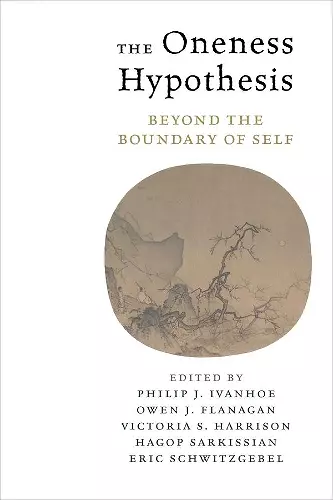The Oneness Hypothesis
Beyond the Boundary of Self
Victoria Harrison editor Hagop Sarkissian editor Owen Flanagan editor Eric Schwitzgebel editor Philip Ivanhoe editor
Format:Hardback
Publisher:Columbia University Press
Published:24th Jul '18
Currently unavailable, and unfortunately no date known when it will be back

This anthology explores the interconnectedness of self and world through the lens of the Oneness Hypothesis, challenging individualistic perspectives.
The Oneness Hypothesis presents a thought-provoking exploration of the interconnectedness of the self and the world. Rooted in various philosophical and religious traditions, this anthology delves into the 'oneness hypothesis'—the idea that individual identity is deeply entwined with the collective existence of others. By examining perspectives from East Asian philosophies and Western thought, the contributors challenge the prevailing notions of hyperindividualism that dominate contemporary society. They argue for a more expansive understanding of the self, one that acknowledges the profound connections we share with people, creatures, and the environment.
The anthology draws from a diverse array of disciplines, including sociology, cognitive neuroscience, and evolutionary theory, to illuminate the implications of the oneness hypothesis. It features insights from influential thinkers such as Zhuangzi, Kant, and Dewey, weaving together their ideas with modern scientific perspectives. By tracing the lineage of the oneness hypothesis through various schools of thought—like Confucianism, Daoism, and Buddhism—the book fosters a rich dialogue about ethics, identity, and cultural differences.
Ultimately, The Oneness Hypothesis invites readers to reconsider the boundaries of the self and encourages a relational view that is not only aligned with contemporary scientific understanding but also promotes greater well-being and happiness. It serves as a call to embrace our interconnectedness, urging a shift away from self-centered behaviors towards a more unified existence that recognizes our place within the larger tapestry of life.
A fascinating collection of very diverse pieces on a most important and too often neglected subject. Truly notable for the range of approaches exhibited, the different traditions or cultures treated, and the variety of questions, both theoretical and interpretative, that are examined. -- Lee H. Yearley, Walter Y. Evans-Wentz Professor of Oriental Philosophy, Religions, and Ethics, Stanford University
Individualism, the assumption that humans are ontologically distinct, fully autonomous, naturally self-interested beings is a foundational philosophical idea of modern Western culture. It is also, arguably, an increasingly disastrous one for the well-being both of the individuals it celebrates and the societies to which they belong. The impressive list of distinguished contributors to this important book show in many different ways that this assumption is highly debatable and culturally contingent. It should be read by anyone interested in the roots of the grave problems currently facing the world. -- John Dupré, director of Egenis, professor of philosophy of science, University of Exeter
Positing that many of the pressing problems of our age are rooted into restrictive views of the boundaries of the self, this fascinating collection of essays provides a wealth of insights about how oneness might—or might not—be relevant today. From history to religion, philosophy (East and West), and psychology, the issue is tackled from a striking variety of different angles. A stimulating and inspiring read. -- Sébastien Billioud, professor of anthropology, history, intellectual history, and religions of contemporary China, University Paris Diderot
The Oneness Hypothesis proposes a fascinating and timely exploration of the idea of oneness from different disciplinary angles, while synthesizing current knowledge and outlining a path forward. The editors of the volume are leading scholars who will have a substantial impact on future conversations and scholarship about this topic. -- Ara Norenzayan, professor of psychology and director of the Centre for Human Evolution, Cognition, and Culture, University of British Columbia
This innovative collection explores this theme from a variety of different angles. -- A. Kind, Claremont McKenna College * Choice *
ISBN: 9780231182980
Dimensions: unknown
Weight: unknown
416 pages